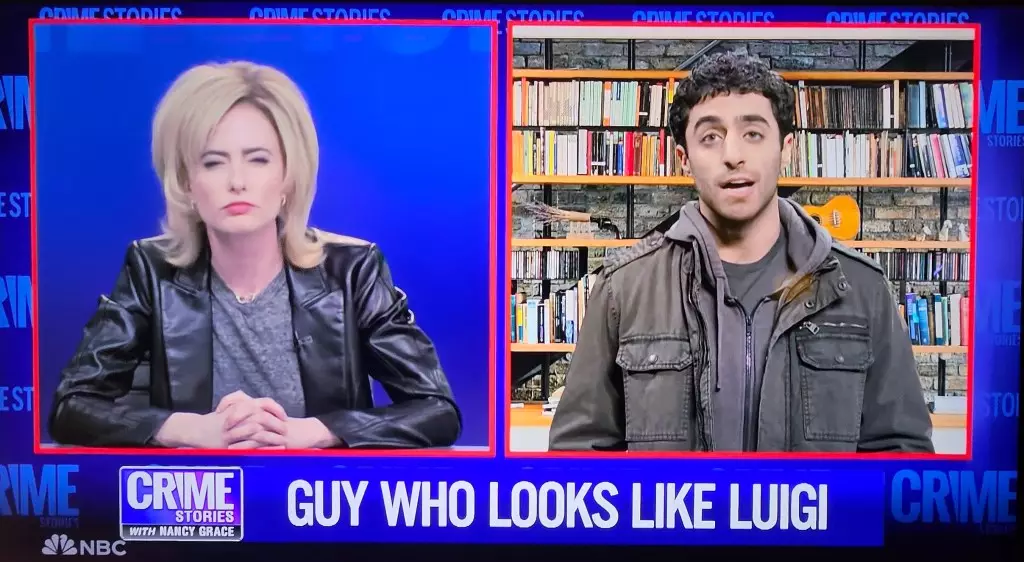Saturday Night Live (SNL) has long positioned itself as a cultural commentary, using humor to address current events and societal absurdities. The recent cold open featuring Sarah Sherman as Nancy Grace took a biting look at our celebrity-obsessed culture, particularly focusing on the bizarre phenomenon of criminal figures becoming fetishized. With the peculiar tale of “healthcare assassin” Luigi Mangione, the skit aimed to critique not just the justice system but society’s warped values regarding fame, sexuality, and the glorification of criminals. The challenge is that while the skit opened on a promising note, it gradually succumbed to familiar comedic pitfalls.
In the wake of Mangione’s arrest for the alleged killing of the CEO of UnitedHealthCare, the cold open set the stage for a complex commentary on crime and charisma. Sherman’s impersonation of Nancy Grace was, at first, spot-on. She captured Grace’s signature outrage and overdramatic flair, making a mockery of the way media personalities often sensationalize crime. The humor effectively highlighted the absurdity of the situation: a murderer being treated as a “sex symbol.” Sherman quipped, “This man is not a sex icon, okay. This man is… a murderer!”
The skit deftly illuminated an alarming tendency in contemporary media, where the villain becomes celebrated rather than vilified. By emphasizing that audiences had turned Mangione into an object of desire, it critiqued society’s fixation on allure over morality.
However, as the skit progressed, it slipped into the kind of repetitive and unoriginal humor that SNL sometimes falls prey to. The continued “sexy slayer” jokes highlighted this decline from a sharp critique to a more mundane comedic format. Rather than delving deeper into the social implications of such a transference of desire, the focus shifted toward superficial laughter. This felt like a missed opportunity to engage in a more substantial dialogue about societal issues regarding crime and celebrity.
The cast members circling around Sherman began to feel like an ensemble of mere props embellishing a familiar setup rather than contributing to the depth of the narrative. This reliance on fallbacks diminishes the potential brilliance of the cold open and makes it harder to remember for its substantive critique.
The skit’s nod to YouTube culture and the “insanely loud ad interruptions” resonates well with audiences who are accustomed to the chaotic media landscape. The notion that serious topics can be overshadowed by eye-catching advertisements further comments on the distraction within the current information ecosystem. This nuance could have been explored more deeply, as it reflects the problems inherent in media consumption today. Instead of expanding on this engaging angle, the skit opted for worn-out punchlines, diluting a provocative examination.
The return of Chris Rock as host evoked nostalgia, inviting audiences to appreciate SNL’s legacy. However, this hint at greatness could not overpower the somewhat lackluster delivery. While Rock certainly possesses the comedic chops and experience to provide razor-sharp insight into these matters, the surrounding material failed to reach its full potential.
As SNL sails through its 50th season, it faces a crucial moment of self-examination. The challenge remains: how to innovate within an established framework that is both beloved and all too familiar. The dynamic between public figures and the narratives surrounding crime must be addressed with a keen edge that transcends cliché, making way for fresh perspectives rather than relying on historical references to formulaic jokes.
As the show prepares for upcoming special episodes, including the anticipated SNL anniversary with past and present cast members, the opportunity exists to redefine its approach to controversial subject matter. Comedy should not just entertain; it should provoke thought, critique norms, and challenge audiences to reflect. If SNL can harness its legendary status while incorporating innovative humor, the show may very well fulfill its potential as a true cultural touchstone capable of navigating the complexities of modern society.
Ultimately, the cold open featuring Nancy Grace served as both an opportunity and a reminder of the ongoing evolution of SNL. While it sparked discussions about the intersection of crime and celebrity culture, it also exemplified the need for originality and depth in comedy. The potential for satire that holds a mirror to society remains endless, and it is up to SNL to navigate that landscape thoughtfully in the years to come.

